Sharing FERPA Information Online: An Incomplete Survey
9 min read
The Family Educational Rights and Privacy Act, or FERPA, gives students and parents rights to access, review, and dispute educational records. FERPA also attempts to define an "educational record."
However, having rights is one thing, being able to use them is another, and being informed of those rights is yet another. In order to get a sense of how easy or difficult is is for students and parents to learn how to use their FERPA rights in different educational settings, we conducted a series of basic searches on charter school districts and large urban school districts.
Our method is pretty simple: start with a Google search on the term FERPA and the phrase "Family Educational Rights and Privacy Act" limited to a specific school district or charter organization.
In some cases, we would then do a follow up search using the site's native search for both terms separately: FERPA, followed by "Family Educational Rights and Privacy Act."
In the text below, we link to our searches and include screenshots so you can see what we saw.
Recovery School District
The Recovery School District returns three documents via Google. Two link to gibberish, and the third has nothing about student or parent rights under FERPA.
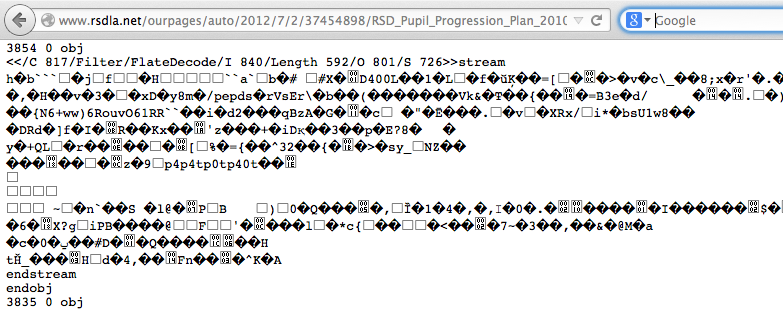
The Recovery School District uses Google for their local site search, so the results are identical to what we see when searching via google.com.
Education Achievement Authority
The EAA has no information about FERPA on their site.
No results are returned via Google.
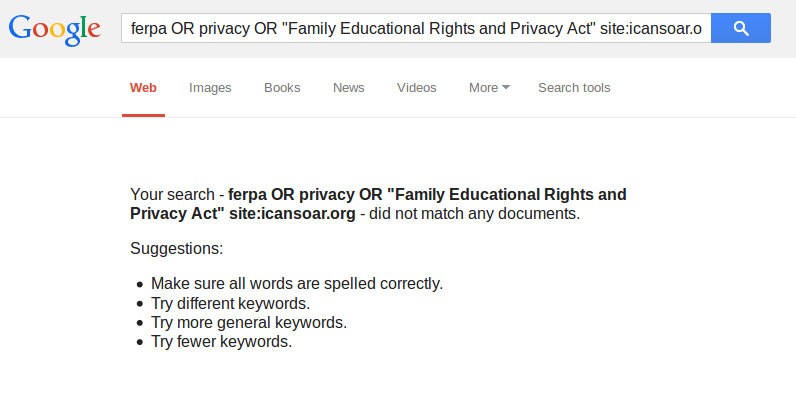
No results are returned via site search.

Rocketship Education
Rocketship Education returns several hits via Google, and they appear to link to pdfs for different schools. However, the pdfs appear to be scanned documents, which means that people can't search within them using the "Find" feature of their web browser. As a result, the only way to find anything is to scroll through and skim each page, which is pretty laborious. This could be fixed by using actual html pages, having their docs available as read-only Google docs, or even uploading pdfs that have been generated directly from word processing software.
Several results are returned via Google, and I found FERPA information in their "Policies" document, which is the first result returned by Google.
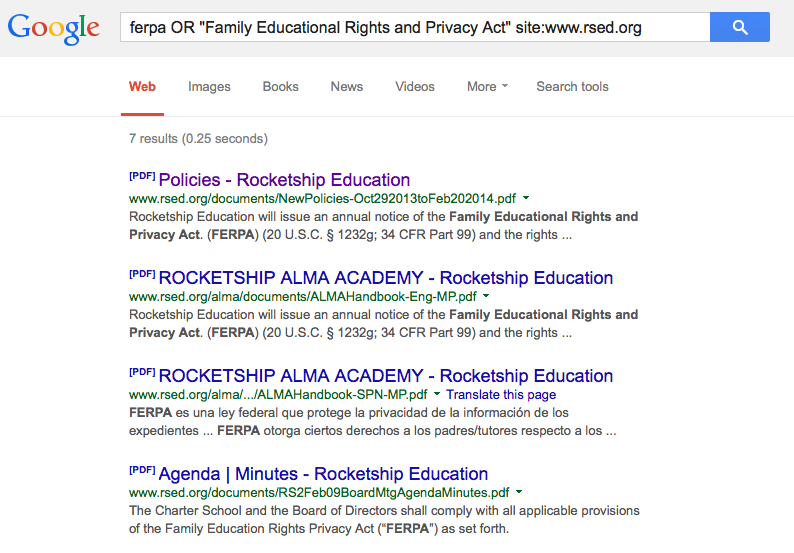
Rocketship Education has no obvious site search on their site.
Aspire Schools
Aspire Schools fares pretty well when searched via Google.
Several results are returned via Google, and the third hit is for their student handbook, which includes FERPA information on pages 27-28.
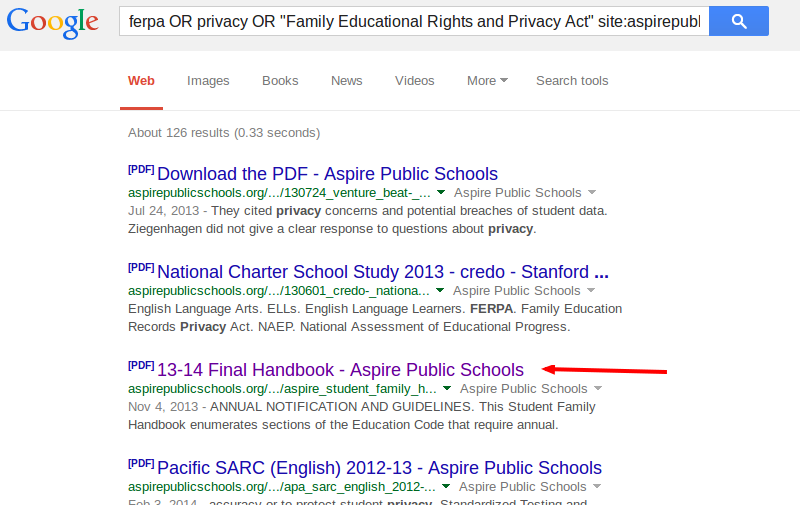
However, their site search returns nothing, which is not very useful.
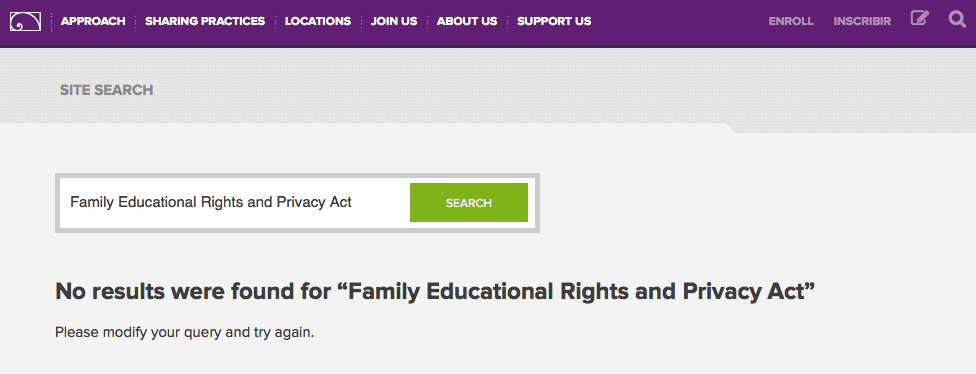
Green Dot
Green Dot returns several results via Google. The third hit links to the Student Policy Manual, a 125 page pdf that appears to mention FERPA several times without specifying student and parent rights under FERPA. My method for searching this doc was to use the "Find" feature in my browser, however, so if the language on FERPA was added as an image when they were creating the PDF, I would not see it.
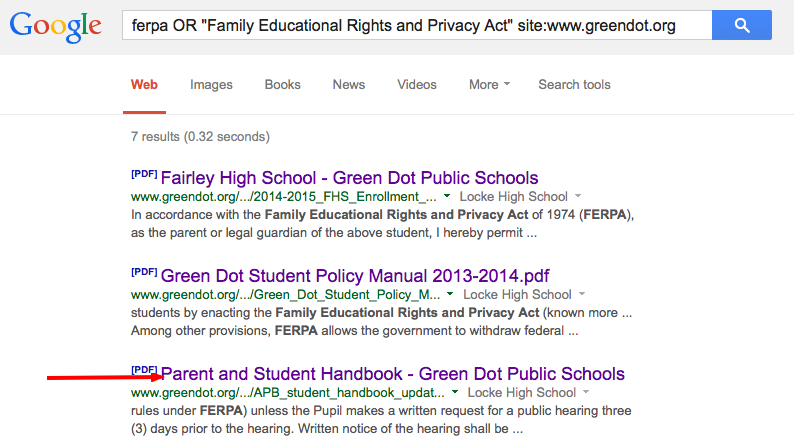
No results are returned via site search.
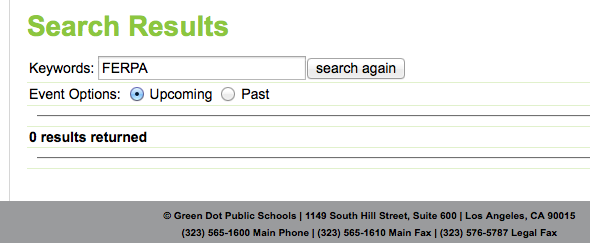
Success Academy Charters
The Success Academy Charters return one result via Google. However, this document does not contain any information on parent or student rights under FERPA.

The site search returns no results.
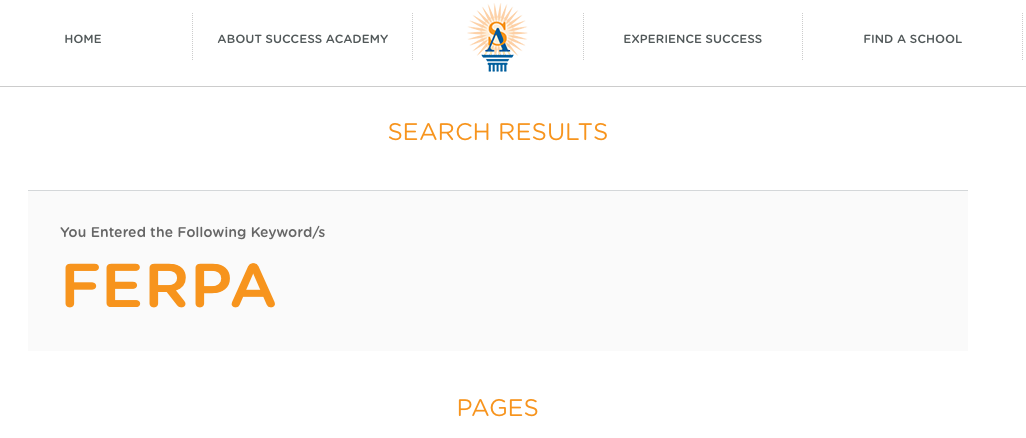
KIPP
KIPP is a slightly different setup because it has the the main KIPP site, with local sites broken down by region.
The top level KIPP site has no results for FERPA via Google.
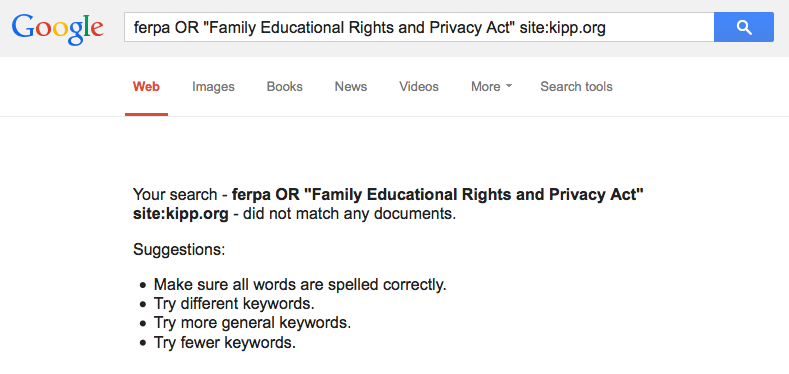
The top level KIPP site also has no results via site search.

However, it's possible that the regional sites could have FERPA information - to get a sense of what the local sites shared about FERPA rights online, we can look at what comes back when we search 5 regional sites. Each regional site covers multiple schools; this search covers KIPP in Massachusetts, the San Francisco Bay Area (including San Jose), Colorado, Austin TX, and Chicago IL.
This search returns three hits. None provide any information about parent or student rights under FERPA; two of the hits are a form (in Spanish and English) asking parents to renounce their rights under FERPA so their students can be included in a Mathematica Policy Research study.
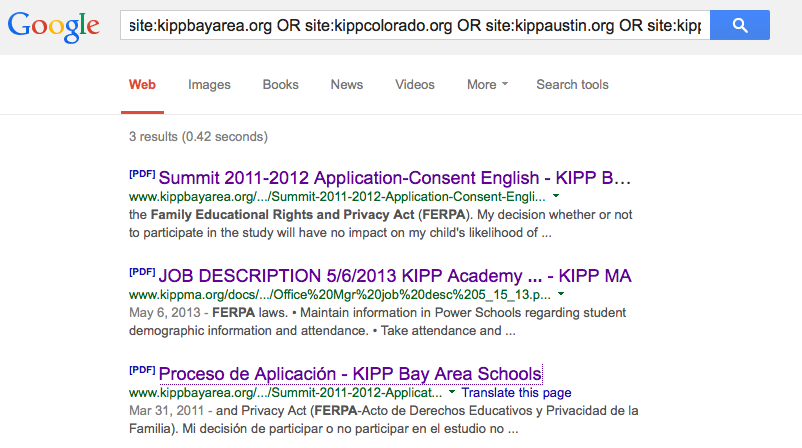
YES Prep
YES Prep returns several results via Google. Included in these results are links to both English and Spanish language versions of their student handbooks. Both handbooks contain detailed information on FERPA, and also mention that students and parents have the right to opt out of directory information.
Other schools would do well to follow YES Prep's example here.
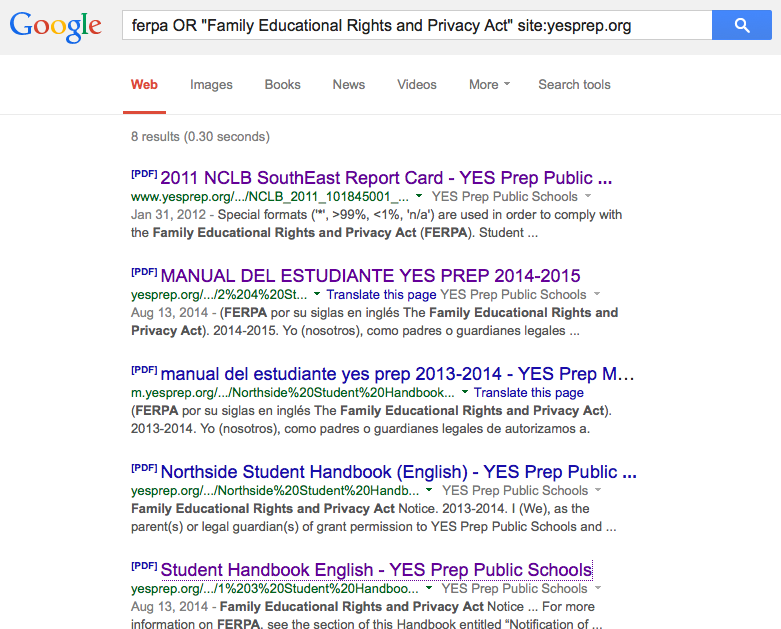
Unfortunately, YES Prep's native site search does not return any results.
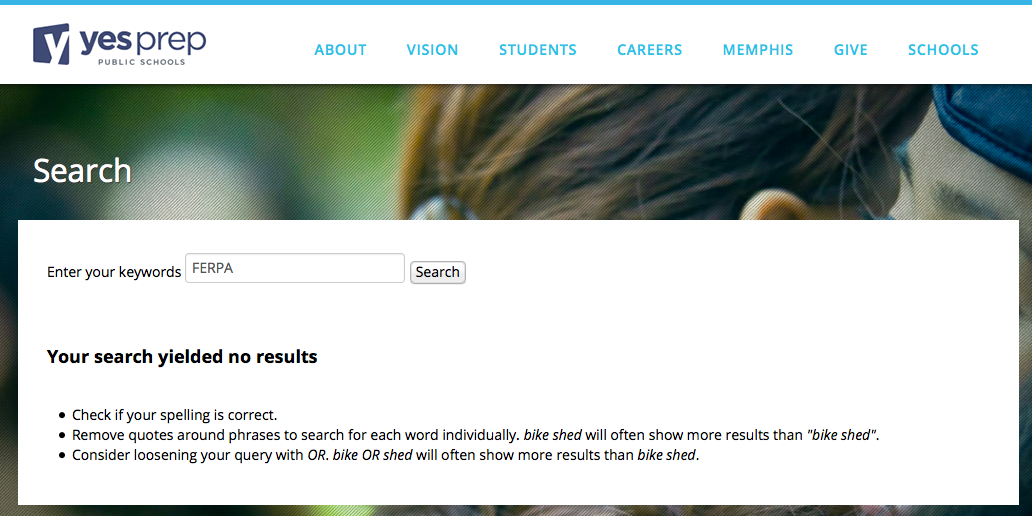
On a technical note, if the YES Prep web team is reading this: your site runs Drupal. You could probably add this module to search within attachments.
Democracy Prep shows no results via Google.
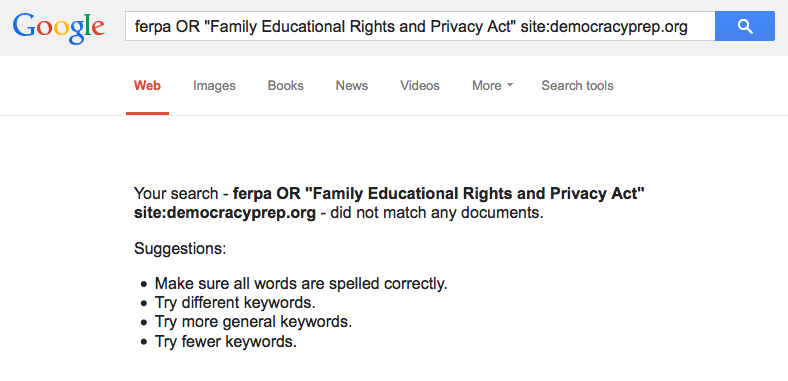
And, Democracy Prep has no obvious search feature on its home page.
Concept
The Concept web presence is organized like KIPP; it has the main organization site in one domain, with schools at other domains. To get a sample, we searched through a subset of sites (the main organization site and five regional sites). Searching via Google brings up two hits; one is a web page that contains a variety of legal links, including two about FERPA. The second hit is a document only posted for the Columbus, Ohio schools in response to an Ohio legal case.
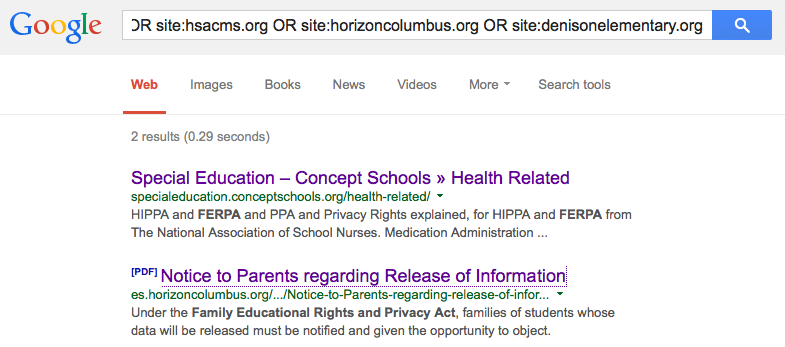
Uno
Uno Charter Schools show no results via Google.
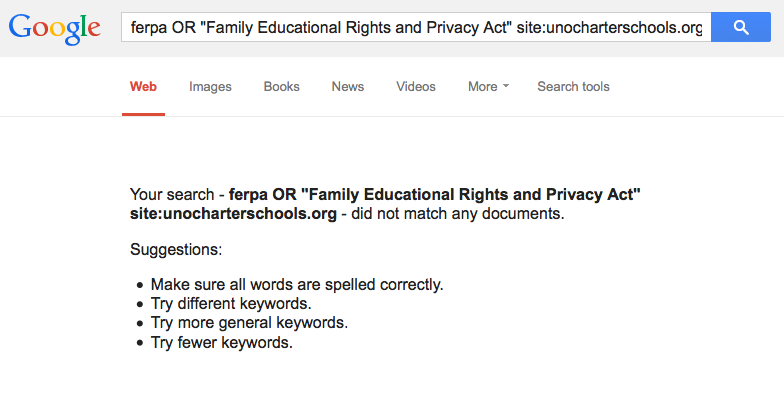
Additionally, no results are returned via site search.

Noble Charter Schools
Noble Charter Schools show no results via Google.
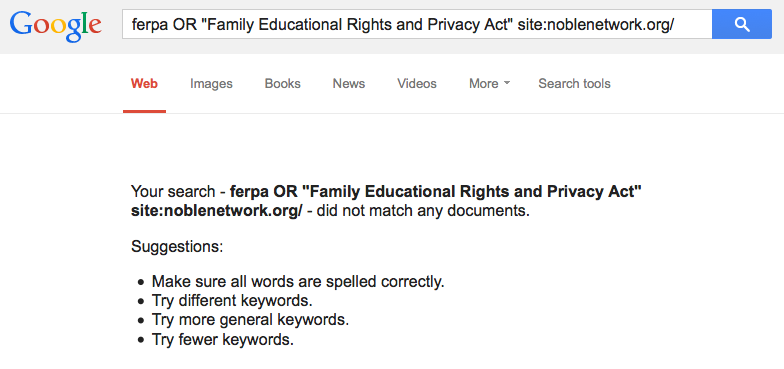
Noble shows no results via site search.
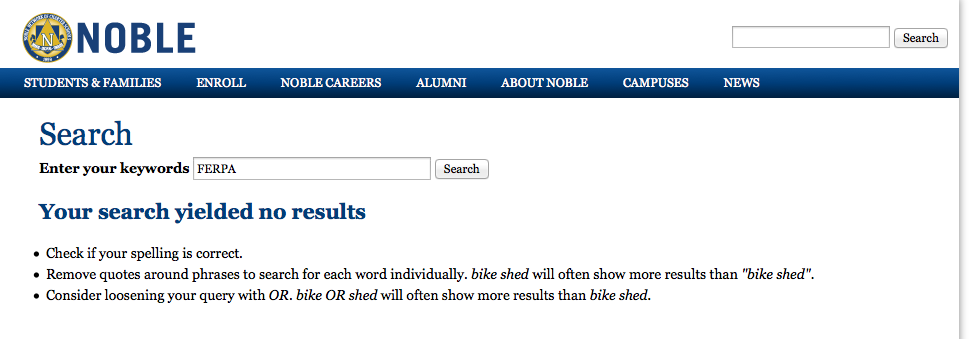
Urban Prep
Urban Prep shows no results via Google.
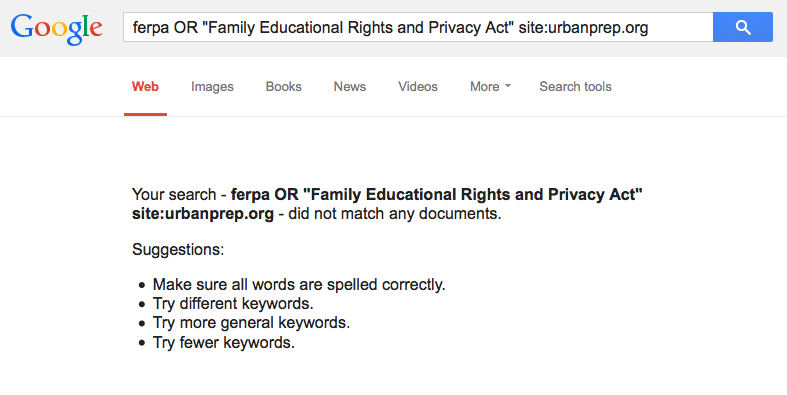
Urban Prep shows no results via site search.

Chicago International Charter Schools
The Chicago International Charter Schools return many hits via Google. The first hit is an English and Spanish version that outlines basic FERPA rights, but does not mention the right to opt out of directory information. However, many of the the other hits on the page are forms that can be used to request access to data as part of research, including this form to avoid review by the data monitoring committee.
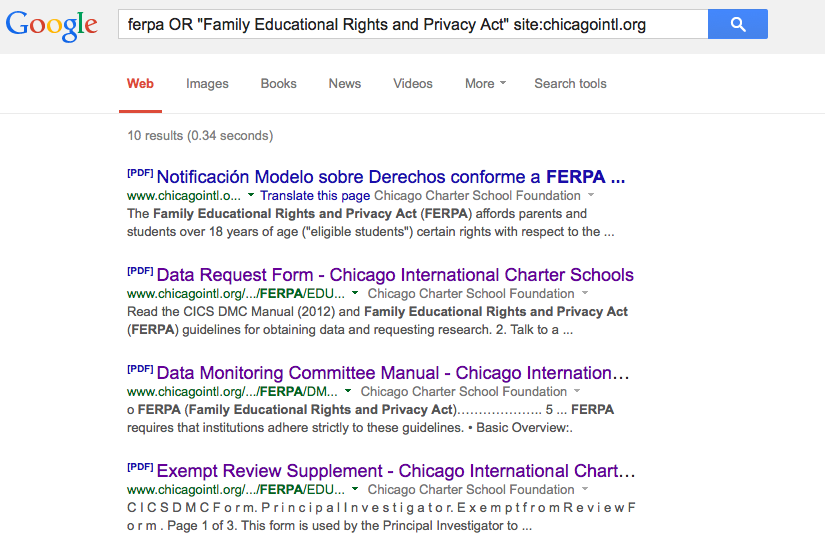
Chicago Public Schools
Chicago Public Schools shows several results via Google, but no information on FERPA at the district level. One school within CPS shows up; the link leads to the school's information on FERPA. Based on this review, the CPS site does not have any obvious resources online showing students and parents their rights under FERPA.
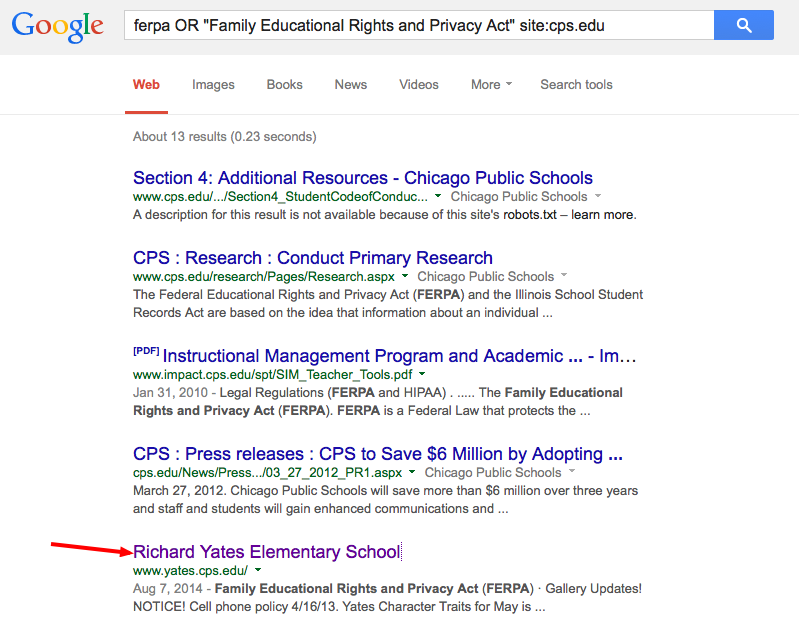
Los Angeles Unified School District
Los Angeles Unified School District returns immediately relevant results via Google. The top hits include both information on FERPA and information on the review process. The LAUSD documentation also flags that students and parents can opt out of directory information.
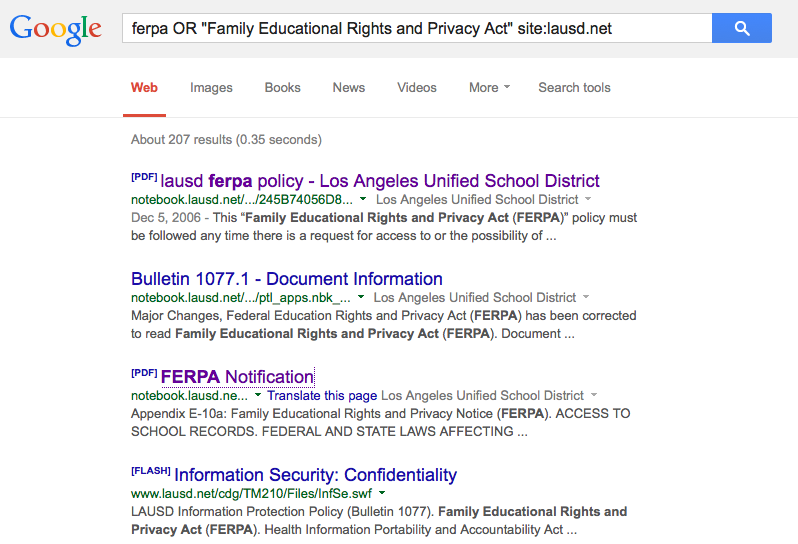
So, while LAUSD has a hard time with technology acquisition and Student Information Systems, the visibility of their FERPA information is something that other districts would do well to emulate.
Portland
Portland (Oregon) Public Schools returns several relevant results via Google. The top hits are all immediately useful.
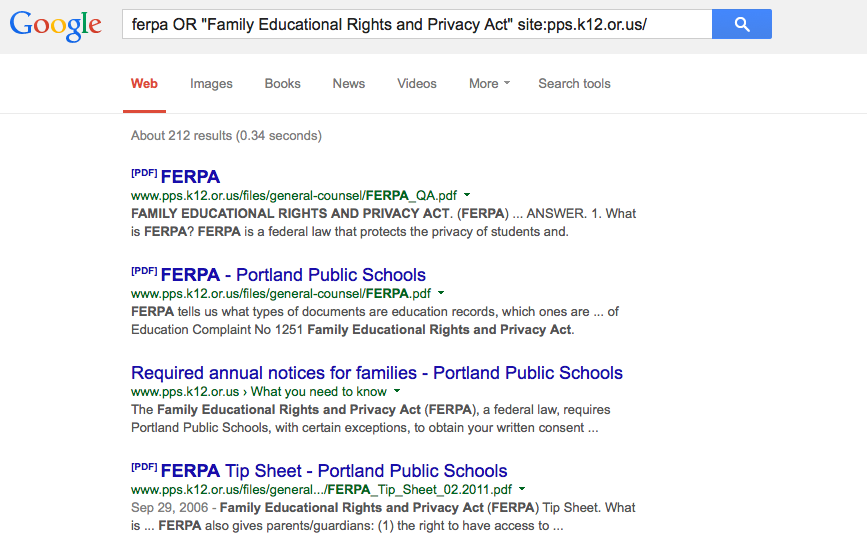
Boston Public Schools
BPS gives several results via Google, including their student handbook in multiple langages. The English language version of the handbook specifies that additional information on FERPA is available in each individual school.
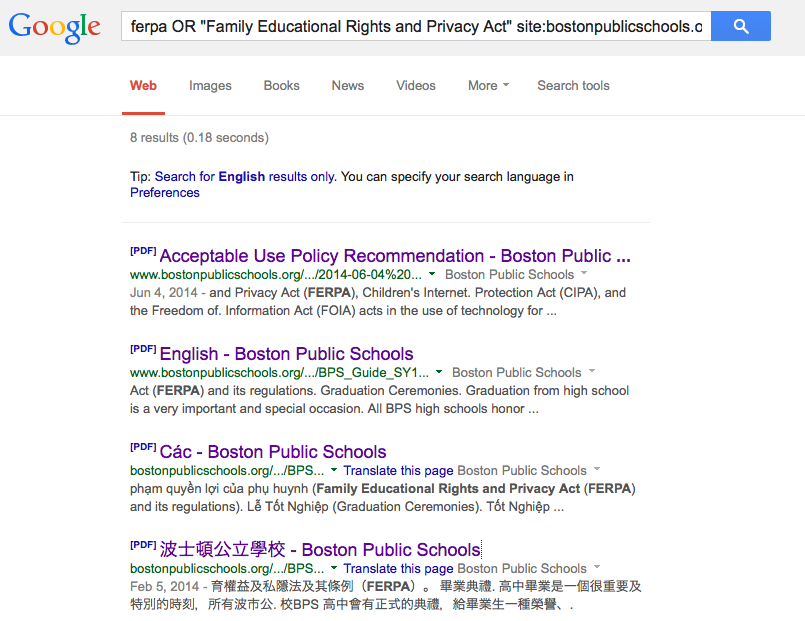
Dallas Independent School District
DISD returns several immediately relevant results via Google. Of all the districts and organizations surveyed here, Dallas provides the most complete and helpful set of materials. They include a set of brochures on what FERPA means, an opt-out form for directory information, and their documentation includes human-readable breakdowns of the legalese. Ideally, they have versions of these documents in multiple languages.
It's also worth highlighting that they are the only organization with a page set aside to explain FERPA on their site: - over time, I suspect that this practice will become the norm.
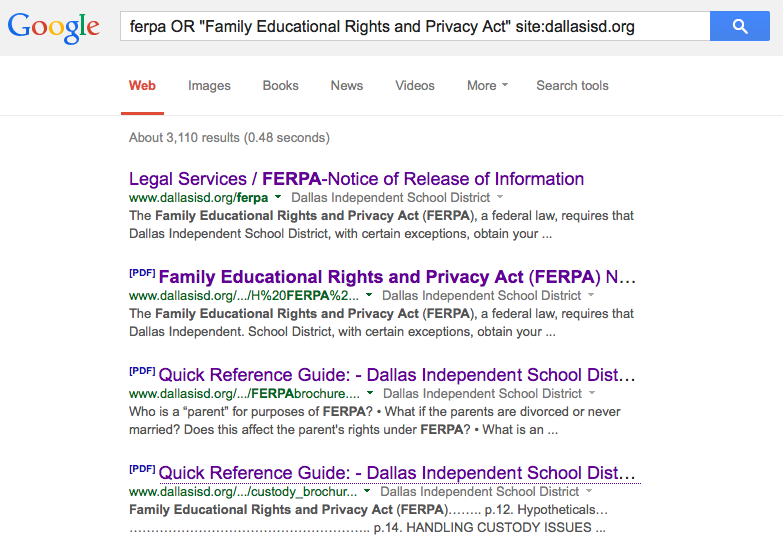
Conclusions
Out of all the organizations and districts reviewed here, Dallas Independent School District provides the best example of how students and parents should be informed about FERPA online. The things they do right include:
- Set aside a page for FERPA information, at a URL () that makes sense;
- Include human-readable guides to FERPA;
- Include information and a form that allows students and parents to opt out of directory information;
- Include information defining that parents have a right to review records
It's also worth noting that, among the public school districts surveyed, the majority of them included comparable information as Dallas, just not as well organized. The notable exception was Chicago Public Schools, where district-level information was not readily available online.
Moving on to charter school organizations, YES Prep did the best job of providing online resources. Aspire also has taken steps to make FERPA information easy to find. However, the number of high-profile charter organizations with zero information available online about FERPA is an oddly avoidable oversight. It's especially troubling given how data and tech heavy some of these schools are - it's imperative that both students and parents are informed of their rights by their schools. The fact that some schools have information and forms online that are used to remove parental rights under FERPA without any accompanying information that defines those rights is especially problematic.
And, it's also worth noting that FERPA rights can be given to parents offline, on paper. It's also possible that there are other places where schools are sharing this information online that did not get seen in this review. However, privacy concerns are going to increase, and schools need to be ahead of these concerns. Sharing accurate, useful information online is an easy step to take.
- icansoar.png
- icansoar_google.png
- aspire_google.png
- rsdla_google.png
- rocket_google.png
- aspire.png
- greendot.png
- greendot_google.png
- succad.png
- succad_google.png
- kipp_sat.png
- kipp_google.png
- kipp.png
- yesprep.png
- yesprep_google.png
- democ_google.png
- concept_google.png
- uno.png
- uno_google.png
- uno_google.png
- uno.png
- urban_google.png
- chi_intl_google.png
- noble_google.png
- noble.png
- urban.png
- cps_google.png
- lausd_google.png
- portland_google.png
- bps_google.png
- dallas_google.png

